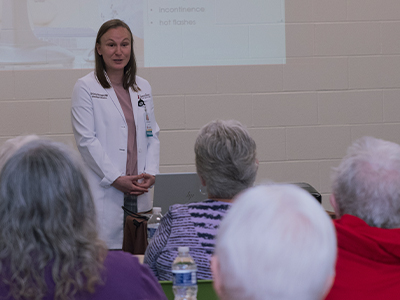Questions about the bladder and menopause were among the most popular topics at the JRMC U: Women’s Health class.
Thirty people attended the class at Two Rivers Activity Center (TRAC) on Thursday, May 18. The event helped them understand more about gynecological concerns like urinary incontinence, vaginal prolapse, painful sex and hot flashes.
“Every individual has unique needs,” said OB/GYN Dr. Emily Stromquist, one of the event’s presenters. “We’re happy to help people navigate the conditions impacting them. We can find solutions that work for their lifestyle and their family.”
Dr. Stromquist is part of the comprehensive OB/GYN team at JRMC. Dr Stromquist, along with fellow OB/GYN Dr. Gregg McAdoo and Nurse Practitioner Makenzie Breitbach, offer 24/7 specialty care to the community.

“Women don’t need to suffer in silence. We hope this class helps people find answers or at least gives them the confidence to know life can be better. Women deserve the best,” Dr. Stromquist said.
Physical Therapist Sherry Benson presented information on pelvic floor therapy alongside Dr. Stromquist.
Pelvic floor physical therapy offers nonsurgical treatment for conditions including urinary incontinence, frequency or urgency with urination, painful sex, and other discomforts and disruptions to a person’s quality of life. Both men and women can receive pelvic floor therapy.
“When I first meet with patients, we usually start with a conversation. I ask about behaviors – What is their diet like? How often and when do they drink liquids? Are they going to the bathroom because they need to? Or have they trained their brain to go out of habit and convenience?” Benson said. “Adjusting behaviors is an effective first step for many of the concerns people have.”
JRMC offers a free evaluation for individuals interested in pelvic floor therapy or women who aren’t sure who to ask about their condition. That evaluation is often a great place to start, Benson said, because the individual and therapist can talk through options and best next steps.
“As therapists, we can help women determine if pelvic floor therapy would help or if an appointment with our OB/GYN team would be more effective,” she said. “People often worry about an internal exam during pelvic floor therapy. We do not have to do that exam if a person isn’t comfortable with it. We can find solutions without an internal exam.”
Other questions Dr. Stromquist answered included:
- Could you speak to vaginal dryness and itchiness?
Vaginal dryness and itchiness can come from a variety of causes. The best practice is avoiding scented soaps or lotions and changing undergarments daily. Some people also purchase new undergarments each year. That can get expensive; however, if it works, it’s a simple, noninvasive solution, Dr Stromquist said. If those don’t help, the OB/GYN team can also offer prescription creams and steroids. - I can’t always make it to the bathroom without leaking. What can I do?
Bladder leaks can occur for any number of reasons, Dr. Stromquist said. Urinary incontinence — when a person loses control of the bladder — is both common and embarrassing. However, it is not normal. People don’t have to live with it. At-home remedies might include tracking food and liquid intake. In addition, a person can try avoiding caffeine and wearing absorbent undergarments. Bladder retraining through pelvic floor therapy may also provide relief. If that doesn’t help, Dr. Stromquist, along with the OB/GYN and Urology teams, can offer medication and surgical options.If urinary incontinence impacts daily activities or if a person is withdrawing from social situations, consider scheduling with a medical professional, she said. - My bladder doesn’t empty completely. What do I do?
The reasons for this can vary, Dr. Stromquist said. At home, people can try urinating from different positions. For example, facing the back of the toilet helps some people, she said. Other times, if people stand for a few seconds after urinating and then try again, they may find relief. If that doesn’t help, medications or surgical interventions might be necessary. - I’m not interested in sexual intercourse. What can I do about my low libido?
Low libido is multi-faceted, Dr. Stromquist said. Underlying health problems like endometriosis, premenstrual syndrome (PMS), depression or heart problems can play a role. In addition, hormonal changes due to perimenopause or menopause can impact a woman’s libido. Exercise and a healthy diet are good first steps. If those don’t help, various treatment options are available, Dr. Stromquist said.
JRMC U Classes
Specialists at JRMC are collaborating with Two Rivers Activity Center to offer monthly opportunities to learn about common health issues. JRMC offers virtual and in-person learning education throughout the year.
Future JRMC U classes include:
- Tuesday, June 13: “Health & Wealth” featuring Foundation Director Lisa Jackson, Social Worker Jamie Heinley and Doug Olson of Thompson & Associates.
- Thursday, June 15: “Bones, Joints & Arthritis” featuring Orthopedic Physician Assistant Patrick Walter.
All events are set for 11 a.m. Attendees do not need to be TRAC members to attend.
LEARN MORE:


